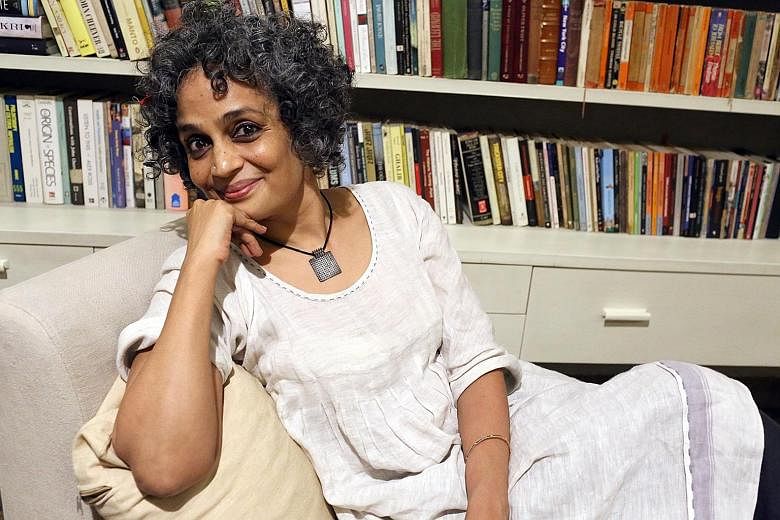FICTION
THE MINISTRY OF UTMOST HAPPINESS
By Arundhati Roy
Hamish Hamilton/ Paperback/ 445 pages/$32.21/ Books Kinokuniya/4.5/5 stars
"I would like to write one of those sophisticated stories in which even though nothing much happens, there's lots to write about," writes a character in Indian author Arundhati Roy's second novel, before adding that it cannot be done. "It's not sophisticated, what happens here. There's too much blood for good literature."
The Ministry Of Utmost Happiness, however, attains the mark of good literature, without stinting on the blood.

It has taken 20 years for Roy, who won the Man Booker Prize in 1997 for her debut novel The God Of Small Things, to write another novel.
That level of anticipation would have killed a lesser comeback, but she has produced a work so magnificent that it exceeds all expectations.
Her taste for controversy - she is a radical political activist for numerous causes - clearly directs her fiction.
She tackles the horrors of the military occupation of Kashmir, the conflict between Hindus and Muslims, the caste system and more. And yet this litany of sorrows enfolds a sliver of wondrous hope.
A motley crew of people take up residence in an old Delhi graveyard. The first of these is Anjum, a middle-aged, irrepressible hijra (transgender woman) who yearns, above all, to become a mother.
After the traumatic outcome of a pilgrimage, she leaves the hijra community and moves into the graveyard, where she lives "like a tree" and founds a makeshift hostel for outcasts.
She is joined by others, such as the enigmatic Tilottama, a reserved yet magnetic woman with ties to Kashmiri rebels, whose story takes over much of the book's second half.
Each of Roy's characters is the nexus of some kind of war, whether the war between selves fought in the body of a transgender person or the wars of race and religion that have devastated the country.
Anjum's friend Nimmo describes this condition as "Indo-Pak", like the India-Pakistan war, a kind of conflict within the soul that cannot be quelled. "It will never settle down," she says. "It can't."
What brings this unlikely community together is the discovery of a dark-skinned baby abandoned at a crowded protest site.
Roy's novel is sweeping in scope and ambulatory in pace. Like the circumstances of its birth, it takes a very long time to get to where it is going, but is very much worth the trip.
From the sly twilight magic of her first paragraph, her language demonstrates that same extraordinary beauty that first seared The God Of Small Things into the brain. One has to force oneself to read slowly, as if savouring a fine meal.
Happiness is the feeling that "her body had enough room to accommodate all its organs". When she writes of the massacre of Muslims in the 2002 Gujarat riots, she describes "how they had folded the men and unfolded the women" - a line more harrowing in its spareness than any graphic description of gore.
It is this fine lyricism that just about threads together what would otherwise be a heavily fragmented narrative.
"How to tell a shattered story?" writes Tilo in her notebook. "By slowly becoming everybody. No. By slowly becoming everything."
Roy does not quite manage this becoming of everything - can anyone? - but the splendid chaos of this novel is a bold, remarkable endeavour to tell the many stories of a country in pieces.
If you liked this read: The God Of Small Things by Arundhati Roy (HarperCollins, 1997, $17.12, Books Kinokuniya), her first novel of forbidden love set in 1969 Kerala, India, about twins Rahel and Estha and the unspeakable tragedy that shatters their family.


